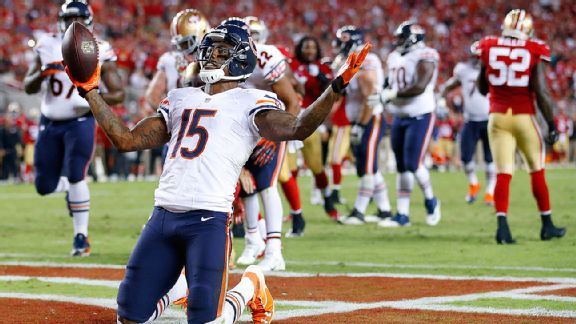
Brandon Marshall caught three touchdown passes to help the Bears catch the 49ers.
For the second time in two weeks, a team that trailed 17-0 in the first half mounted a rally and pulled out a highly improbable victory.
On Sunday night, on the possession after the San Francisco 49ers took a 20-7 lead in the third quarter, the Bears’ win probability dipped to 5.2 percent. The Bears finished that drive with the second of Brandon Marshall’s three touchdown catches, making the score 20-14 and improving their probability of winning to 20.3 percent.
The first snap after the ensuing kickoff was the game’s biggest play in terms of win-probability swing. Kyle Fuller’s interception of Colin Kaepernick’s pass boosted the Bears’ chances of winning by more than 25 percentage points.
The Bears’ win probability surpassed 50 percent on Jay Cutler’s touchdown pass toMartellus Bennett on the next play, and the Bears never had less than a 45 percent likelihood of winning in the final 13 minutes.
Less is more
Tony Romo Career by Passes
| Fewer than 30 | 30 or more | |
|---|---|---|
| W-L | 23-8 | 41-38 |
| TD/Int | 3.1 | 1.7 |
| Total QBR | 73.5 | 60.4 |
Romo threw 29 passes Sunday in the Cowboys' 26-10 win over the Tennessee Titans. He completed 66 percent of his passes, but he was sacked four times and averaged 6.1 air yards per pass. His Total QBR was 63.
Total QBR is a metric on a 0-to-100 scale, with 50 being average. Even when Romo throws 30 or more passes, he performs at a level above the NFL average.
Don’t blame Saints’ offense
Five other teams since 2006 have posted a worse defense/special teams efficiency in their first two games, and four of them finished under .500. But there might be some hope for New Orleans -- the 2007 New York Giants finished 10-6 and won the Super Bowl.


没有评论:
发表评论